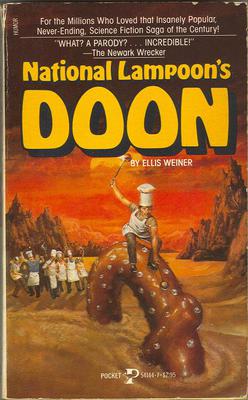He looks the part far more than Stewart, though: an ugly lump of a man, as Herbert put it.
“And what of the teachings of your father?” she’d challenged. “Did he instruct you to sabotage the raw materials of your competitors?”
Pall shot her a glancing look. She referred, he knew, to a practice he had authorized some months before: sending squads of Freedmenmen brewworkers out to the pre-beer pools, and diluting the beer with water. Pastry commandoes and doughnutmen reported from the cities widespread dissatisfaction with the diluted brew. Even the Schlepping Guild, normally secretive, had begun to voice complaint…
From

I dunno. I mean, it is a sci-fi movie with shroom-powered FTL travel, space nuns, skyscraper-sized earthworms, space Sufism, and such. I’m not sure that authenticity is really a goal here.
That being said I loved both Lynch’s and Villeneuve’s takes on Dune and both are worthy of praise and criticism in their own ways.
I definitely agree with previous claims that Lynch’s Dune was so much better with a lot of its world building and atmosphere. (The comment upthread about the Seeker scenes really nailed some of the problems I had with Villeneuve’s version.) Lynch’s Dune had an amazing and unique aesthetic to it.
Villeneuve’s Dune has thus far told a much more competent story. Maybe it’s not faithful to the book, but it translates much better to screen. I am not a fan of it being split into many parts. It ended just as things were getting “good”, and at the time there was zero commitment by the studio around finishing it. At least with it being in multiple parts, it will have an opportunity to let the dense source material “breathe”. Something Lynch’s Dune never really had the opportunity to do since it had so much to cram so much into so little time. On the other hand it also wasn’t weighed down by so much exhibition.
I am glad both versions exist, and I wish Lynch wasn’t so down on his adaptation. Yeah it was a flop, it has a lot of baggage for him, it wasn’t what he was going for, and as a finished product it’s largely an incoherent mess. But it’s a beautiful, weird, wonderful Lynchian mess. I mean if you want an unchallenging viewing experience, Lynch is not your go-to.
That was kinda my point. There are merits and demerits to both. But to declare one worthless and take on all comers to defend that as the only truth is not remotely cool.
Original radio series.
Led to original TV series.
Led to original Infocom text adventure.
Led to original novels.
Led to the movie, which as I recall DNA had written a treatment including the POV gun.
It’s worth noting because Douglas Adams himself kept adapting the story every time he jumped media. Partly because the original radio series was half improvised, and rewriting meant “ooh, I could do this instead!” but mostly because what works in radio doesn’t work in television as well, and writing also has a different pace.
Infocom before novels?
Stage production.
Only in my personal experience, alas. The first novel was published in 1979, the Infocom game in 1984.
I experienced the radio plays first in late 1980, then in 1982 I saw the television series on PBS. I didn’t get the novel until 1985, long after my friends and I had spent many, many nights at an Apple II trying to solve the puzzles of the game.
This topic was automatically closed after 5 days. New replies are no longer allowed.


